Hi Quartz Africa readers,
“Nairobi is celebrating our status as a global financial and tech hub, but we still want to pay majengo (slum) salaries.” This was according to Ali Hussein Kassim, founder of business advisory firm AHK & Associates, who spoke at a panel session on the future of tech I attended this week organized by Rest of World.
The panel, moderated by my amazing Quartz predecessor, Yinka Adegoke—who is now the strategic initiatives editor at Rest of World—focused on tech talent on the continent.
It’s a story we often write about: the high demand for Kenya’s tech talent and the rising status of Nairobi as a tech and financial hub. The 360-degree view into the talent question was eye opening.
“Demand supersedes supply. Whenever certain roles open up, we have sleepless nights trying to fill those roles,” said Grace Galaty, the head of talent acquisition in Africa and Asia at Wasoko, a Kenya founded e-commerce startup that has seen revenues increase from $300,000 in 2017 to $27.4 million in 2020. The number of employees rose from 57 to 372 over the same period.
Galaty spoke of how there’s a lot of talent at the junior level, but the higher up the chain one goes, or the more specialized the tech talent needed, the harder it is to source local talent.
Nanjira Sambuli, a tech fellow at Carnegie Endowment, spoke about how Microsoft’s Africa Development Center (ADC) recently hired 450 mostly Kenyan engineers, and startups can’t compete with the salaries they offer. “If companies are going to come and take these many people from the local ecosystem, leaving startups back to the drawing board looking for more talent, there should be a policy requirement for them to commit to upskilling new talent.”
It’s an interesting take on big companies hiring locally, which many assume is a good problem to have.
—Ciku Kimeria, Africa editor
What to watch for in the Quartz Africa Member Brief
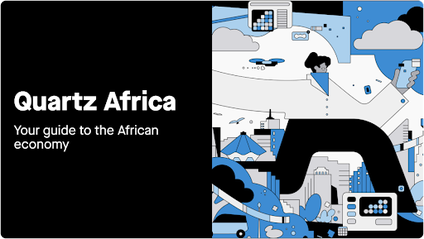
Cheat sheet:
💡The opportunity: The numbers tell a compelling story: nearly 97% of Africans were not insured in 2019. The gaming population is largely young. Almost 60% of Africa’s population is under 25. The median age of the continent is 20. Through blockchain gaming, Usiku Games wants to get young Africans insured.
🤔 The challenge: Usiku plans to forge a private-public partnership with the Kenyan government, which will allow national insurance funds to accept tokenized monthly premium payments—a challenge in most African countries.
🗺 The roadmap: Popularizing the concept of “play-to-save” among the youth and helping them pay for their health insurance premiums will erase the stress of looking for money to pay for medical treatment.
💰 The stakeholders: Governments have to work to reduce internet access costs, which are still relatively high. Hospitals and national insurance funds have to work alongside gaming startups to bring young gamers into these tokenized insurance schemes.
Learn more about Usiku Games in this coming Wednesday’s edition of the Quartz Africa Member Brief. To get the Member Brief directly in your inbox (and save 40%), become a member today!
[button href=“https://qz.com/africa/subscribe/plan/?utm_campaign=0722-MemberBriefPreview-AfricaWeekly&code=QZAFRICA40”]Join Quartz Africa with 40% off[/button]
Stories this week
Kenya’s digital literacy failure has become a black market success in Uganda. A Kenyan project initially designed to equip grade one pupils with tablets failed, but the gadgets have been spotted on Uganda’s black market. Kenyans are not pleased. Faustine Ngila revisits the scandal that killed the dreams of millions of pupils.
Meta’s AI will translate 55 African languages. In what Meta CEO Mark Zuckerberg calls a more inclusive internet, his company is leading research work to translate African languages using AI to boost technological inclusion and eliminate language barriers to the internet economy. Faustine Ngila reports how this will work.
Ghana returns to IMF aid as inflation bites. With inflation reaching a 19-year high in June, Ghana is looking for means to breathe life into a flailing economy. Alexander Onukwue reports on the IMF’s visit to the country for what may become yet another bailout.
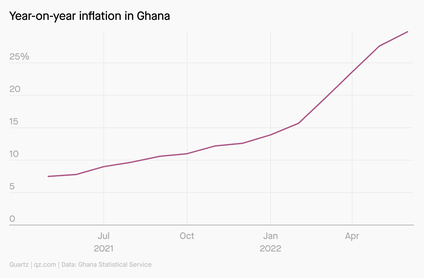
Inflation is making “buy now, pay later” attractive. As food and fuel prices keep rising, Africans are finding the model of obtaining goods to pay later on interest free terms quite enticing. Conrad Onyango gives us a look at the various types of companies entering this space.
How basketball inspired a generation in South Sudan. As Silalei Shani writes, Africa’s “Cinderella story” lies in South Sudan, which finished the first round of basketball qualifiers undefeated. Here’s how the country built a fail-safe structure for basketball development.
Nigeria’s adult population tops the world in crypto adoption
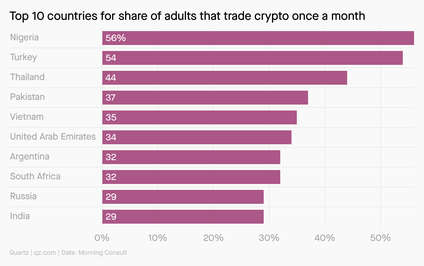
Bitcoin has lost over half its value since the beginning of the year, making its $68,000 high in November 2021 feel like a distant memory. But in six countries, more than a third of the adult population continues to buy or sell cryptocurrencies at least once a month, says a report by global research firm Morning Consult, published July 7 (link takes you to download request for pdf).
Nigeria, with a population of 210 million people, tops that list with more than half of the adult population actively trading in cryptocurrency.
The G7 is playing catch-up with China in Africa
“There should be a give and take, concessions, not just a goal to outdo China.” —Efem Ubi, an associate professor and director of research at the Nigerian Institute of International Affairs
This past June, the leaders of the world’s largest IMF economies and wealthiest liberal democracies gathered at Elmau Castle in Germany’s picturesque Bavarian Alps for the annual G7 summit. There, they unveiled the Partnership for Global Infrastructure and Investment (PGII).
Spearheaded by US president Joe Biden, PGII I has four pillars: healthcare, gender equality and equity, climate and environment, and digital connectivity. It will also include hard infrastructure projects with a special focus on Africa, which at first blush seems a pretty clear reaction to China’s Belt and Road Initiative.
With China’s historically dominant role in financing Africa’s infrastructure projects, Kang-Chun Cheng explores how the G7 will have to manage its expectations.
Person of interest
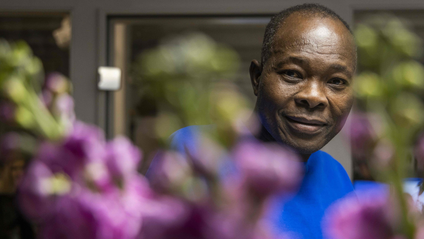
Image copyright: Odd Andersen / AFP via Getty
Francis Kéré, the first African to win the Pritzker Architecture Prize, knows the West’s blindspots on African architecture. He will represent the continent at the Triennale Milano’s new exhibition, which will showcase the work of 400 artists, designers, and architects from 40 countries, with pavilions from six African countries. He describes his role at the century-old Italian cultural institution as both a privilege and a burden.
Instead of publishing a heady manifesto, his tactic is to offer examples. Through a series of installations over the next five months, Kéré hopes to show off African ingenuity, slaying some myths along the way.
Kéré spoke to Anne Quito about the ingenuity of African architecture and how best to portray it as an “unknown” phenomenon without being patronizing.
Dealmaker
Zazuu, a UK-based Africa-focused platform for comparing remittance services, raised $2 million from Launch Africa Ventures, Founders Factory Africa, and a number of other African investors. British rapper Tinie Tempah, and iROKOtv founder Jason Njoku also invested. Zazuu is an aggregator rather than a remittance provider but the company seems to have plans to add more services with the money it has raised.
Solar Panda, a Kenyan manufacturer of pay-as-you-go solar home systems, received $8 million in funding from Oikocredit, and Electrification Financing Initiative (EDFI ElectriFI). The company, which has produced 200,000 home systems and has 37 retail branches within Kenya, plans to invest the funding to reach more homes in Kenya.
Quartz Gems
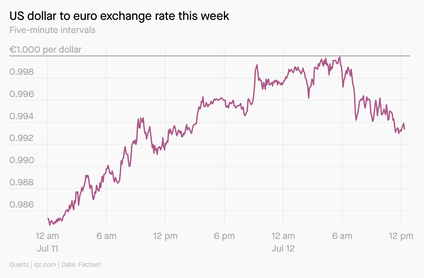
Earlier this week, the euro and the US dollar were worth the same, then the euro slipped below the dollar, and at time of writing, is back to parity. It’s not a great milestone for the euro, which has been stronger than the dollar since 2003.
Investors are worried about a looming economic crisis in Europe. The European Central Bank has been slower to raise interest rates, and Russia is threatening the continent’s natural gas supply following economic sanctions over the war in Ukraine. And energy security continues to be a concern as the EU has agreed on a Russian oil ban, forcing nations to find new sources.
If recession fears are dragging down the euro, what’s boosting the dollar? It’s about security. In times of economic uncertainty, many investors hold dollars because they believe the currency and the assets denominated in them are safer. The higher demand, the higher the value.
Other things we liked
Mr Eazi is both an Afrobeats star and a tech investor. Nigerian award winning artist Mr Eazi wants to solve problems in both music and tech. Rest of World’s Abubakar Idris reports on this surprisingly practical collaboration.
Mo Farah was trafficked from Somalia to the UK. A new documentary, reported on by the Guardian’s Stuart Jeffries, lays bare the fine details of how the UK’s long distance marathoner Mo Farah found himself in the UK as a child, exposing cruel Tory policies.
No Tour for Black cyclists. For African Arguments, Georgia Cole and Temesgen Futsumbrhan Gebrehiwet explore the reasons behind a lack of Black cyclists in the Tour de France, making the case that there are more talents like Biniam Girmay, the Eritrean who became the first African winner of the Giro D’Italia in May.
Inside Uganda’s six months without a central bank governor. As the Daily Monitor’s Daniel Kalinaki opines, 24 weeks without the office of the central bank governor would be a big cause for concern for any nation. Not in Uganda though, where the seat has remained vacant since the death of the governor in January.
Silencing dissent in Benin. Flore Nobime and Olivier van Beemen, for Africa is a Country, narrate their ordeal at the hands of the police in Benin, portraying an ostensibly stable democratic nation’s slide into targeted harassment of opposition figures and journalists under the presidency of Patrice Talon.
ICYMI
Join the Women Techsters Bootcamp. Women aged 16-40 years in Nigeria, Kenya, South Africa, Egypt, Ethiopia, Madagascar, South Sudan, Morocco, Algeria, Ghana, Angola, Mozambique, Uganda, and the DRC can apply for a three-week class that will teach them new dynamics in data science, software development, cybersecurity, product design, and product development. (July 26)
Participate in climate action. The Google Climate Impact Challenge is open for project leaders aiming to build solutions to control climate change in Africa. $5 million in funding is up for grabs. (July 29)
🎵 This brief was produced while listening to “Energy” by Igor Mabano (Rwanda)
This week’s brief took you to 🇬🇭, 🇰🇪, 🇸🇸, 🇳🇬, 🇧🇫, 🇸🇴, 🇪🇷, 🇺🇬, 🇧🇯 and 🇷🇼
Our best wishes for a productive and ideas-filled week ahead. Please send any news, comments, suggestions, ideas, good translations, and African architecture to africa@qz.com. You can follow us on Twitter at @qzafrica for updates throughout the day.
If you received this email from a friend or colleague, you can sign up here to receive the Quartz Africa Weekly Brief in your inbox every week. You can also follow Quartz Africa on Facebook.















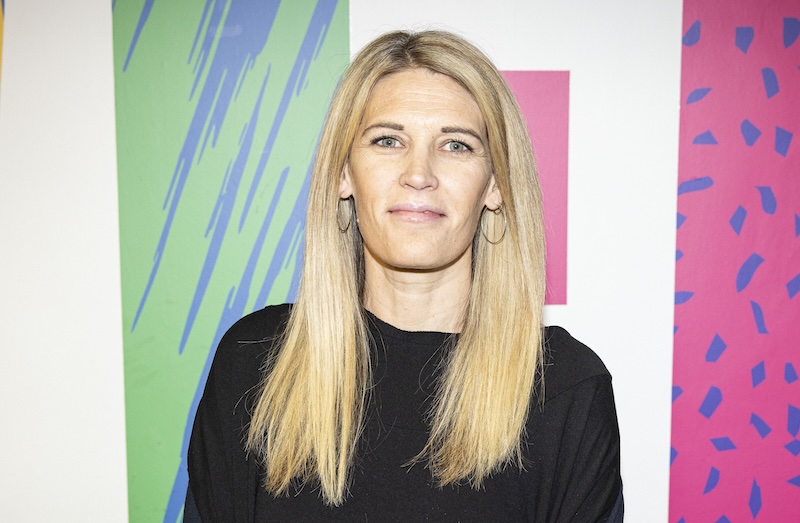




Discussion about this post